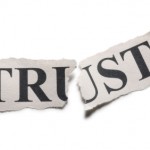 Good business and personal relationships are based on trust. We like to interact and do business with people we feel comfortable with and have some degree of trust and rapport with. Where there is high trust and resonance, in time, some of these relationships ripen into long lasting friendships.
Good business and personal relationships are based on trust. We like to interact and do business with people we feel comfortable with and have some degree of trust and rapport with. Where there is high trust and resonance, in time, some of these relationships ripen into long lasting friendships.
And yet sometimes – in both our personal and professional lives – we get betrayed in our trust. We can be left feeling shocked, angry and hurt as we try and make sense of what just happened and why this might have happened.
When trust gets broken, the range of reactions can vary from total shock – the common expression of “I didn’t see that one coming” to as another client put it, “I had a strange feeling that things were not quite stacking up but I just didn’t have the evidence so gave the person the benefit of the doubt but with disastrous consequences. Now I would never do that and would instead slow the process down, buy more time and do rigorous due diligence.”
So what is this intangible concept called trust and why does it matter so much?
Trust is critical because it is the absolute backbone of any relationship that we can count upon. It is through having trust that we know that the other person can be counted upon to deliver on their promise and to do this more or less consistently and with some degree of care.
And yet trust can be destroyed just as easily. Talking to people who have been betrayed whether in personal or business relationships, a common hindsight was that if they had looked closely enough the signs were there but they chose to ignore and overlook it. They silenced that small voice which kept raising the red flag.
In “The speed of Trust”, author Stephen Covey says one of the greatest losses we feel is broken trust. But he says, all is not lost and that challenging and time consuming as it is, trust can be re-built and restored and that one can redeem themselves and create newness. You have to learn to acknowledge your role in it, apologize, and have humility. Then you need to find a way to involve the person in a process of coming up with a new relationship.
Stephen Covey uses the metaphor of an Emotional Bank Account. “Like a financial bank account, you can make deposits and take withdrawals from the account. When you make consistent deposits, out of your integrity and out of your empathy—that means your understanding of what deposits and withdrawals are to other people—those two things—empathy and integrity—little by little, can restore trust.”
Of course there are times and situations where some relationships are totally beyond repair such as where there has been fraud, manipulation and other pathological behavior.
So what can you do? Here are eight questions for your reflection and action:
• Is there a business deal or relationship that you have some concerns about but which you are overriding?
• Is there an inner nag – whose voice you are silencing?
• How high are your levels of self-trust?
• Are there things you are tolerating when really you need to be calling the other party to greater accountability?
• Are you engaging in any behavior currently which could lead to broken trust?
• How do you stack up on the following behaviors which build trust such as being respectful, taking responsibility for your actions, being accountable, keeping your word, being transparent and attending to broken trust?
• As a leader, how do you go about engendering a high trust culture? Is yours a high trust or low trust organization? Low trust organizations include the following – political games, high suspicion, hidden agendas, cliques, interpersonal conflict, cynicism, negativity, silo rivalries, complaints, people bad-mouthing each other while sweet-talking to their faces and a lack of safety. Bear in mind, John Whitney – Professor at Columbia Business School – study “mistrust doubles the cost of doing business.”
• Trust or lack of trust permeates every relationship. As an employee how are you adding or detracting to the company culture and its reputation through your daily behaviour?
My Australian colleague, Vanessa Hall, author of “The truth about trust in business” expresses it aptly – “trust is fragile – handle it with care.”
Jasbindar Singh is a leadership coach who helps managers and leaders build high trust relationships and get the best from themselves and their teams.






 Follow Jasbindar on Twitter
Follow Jasbindar on Twitter



